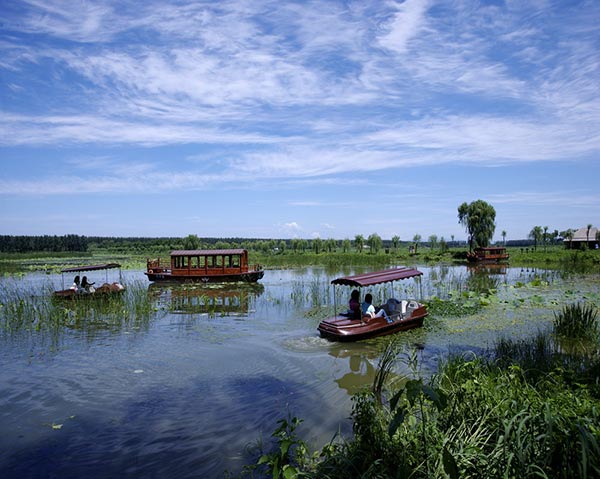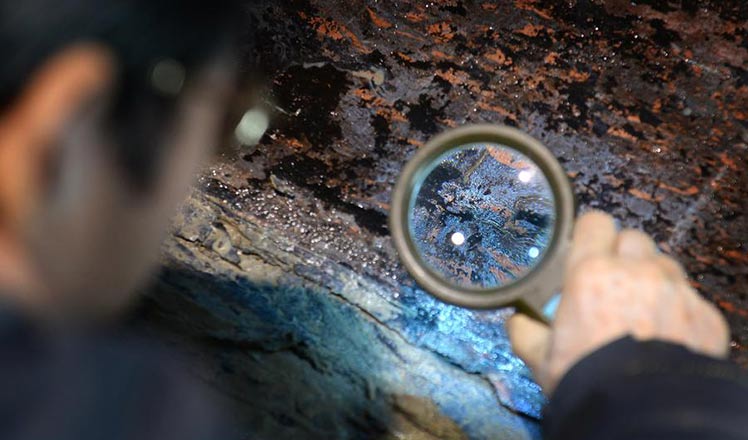A prescription to protect 'the Earth's kidneys'
Updated: 2015-12-23 07:55
By Xu Lin(China Daily)
|
||||||||
 |
|
Boats with tourists at the Health Bridge Wetland Park in Beijing's Shunyi district. The park keeps tourism promotions to a minimum and restricts visitor numbers to protect the wetland. [Photo provided to China Daily] |
That's not only in terms of healthier wetlands but also by raising awareness about environmental protection, and crafting a successful balance of preservation and ecotourism.
"Nature's kidneys" absorb toxins. Marshlands sustain biodiversity. They quell floods.
And they improve regional weather.
The capital contains six wetland reserves covering a total of 21,000 hectares.
The city will gradually build a wetlands-protection system based on reserves supplemented by smaller protected lots.
Shunyi district's 330-hectare Health Bridge Wetland Park's recycling plant processes 2 million tons of sewage from Yangzhen township annually. It stores 3 million tons of precipitation, protecting surrounding villages from floods.
And it serves as a vital habitat and migration stopover for birds. It also hosts a diversity of aquatic plants and animals.
A national monitoring station records daily data about the wetland's species, populations and living situations.
Health Bridge has long cooperated with the Beijing Wildlife Rescue and Rehabilitation Center to rescue and free captive birds.
Touch screens, signs and documentaries educate visitors. Visitors can also take electric boats and karts, ride bicycles, fish or play a real-life version of the video game, Counter-Strike.
Deputy director Cai Chunyi suggests bird-watchers contact the park before visiting so staffers can tell them where and when to best observe birds.
Cai says ecotourism revenues are invested in preservation. But the park keeps tourism promotions to a minimum and restricts visitor numbers.
Government efforts have won support from such nonprofits as Beijing's Black Leopard Wildlife Conservation Station.
"The city is making progress in wetland protection and restoration through such actions as returning farmlands to wetlands," founder Li Li says.
"The government is taking a scientific approach to planning. The public is becoming more aware of wetlands' importance."

 Whatever the shape or size of a tree, Merry Christmas!
Whatever the shape or size of a tree, Merry Christmas!
 The world in photos: Dec 14 - 20
The world in photos: Dec 14 - 20
 First American woman who works as captain for a Chinese airline
First American woman who works as captain for a Chinese airline
 Life of a family amid Beijing's red alert smog
Life of a family amid Beijing's red alert smog
 External coffin lid of 2,000-year-old Chinese tomb opened
External coffin lid of 2,000-year-old Chinese tomb opened
 First Miss Iraq named in decades
First Miss Iraq named in decades
 Iraq holds its first beauty contest in 40 years
Iraq holds its first beauty contest in 40 years
 Highlights at the Light of the Internet Expo
Highlights at the Light of the Internet Expo
Most Viewed
Editor's Picks

|

|

|

|

|

|
Today's Top News
Shooting rampage at US social services agency leaves 14 dead
Chinese bargain hunters are changing the retail game
Chinese president arrives in Turkey for G20 summit
Islamic State claims responsibility for Paris attacks
Obama, Netanyahu at White House seek to mend US-Israel ties
China, not Canada, is top US trade partner
Tu first Chinese to win Nobel Prize in Medicine
Huntsman says Sino-US relationship needs common goals
US Weekly

|

|








